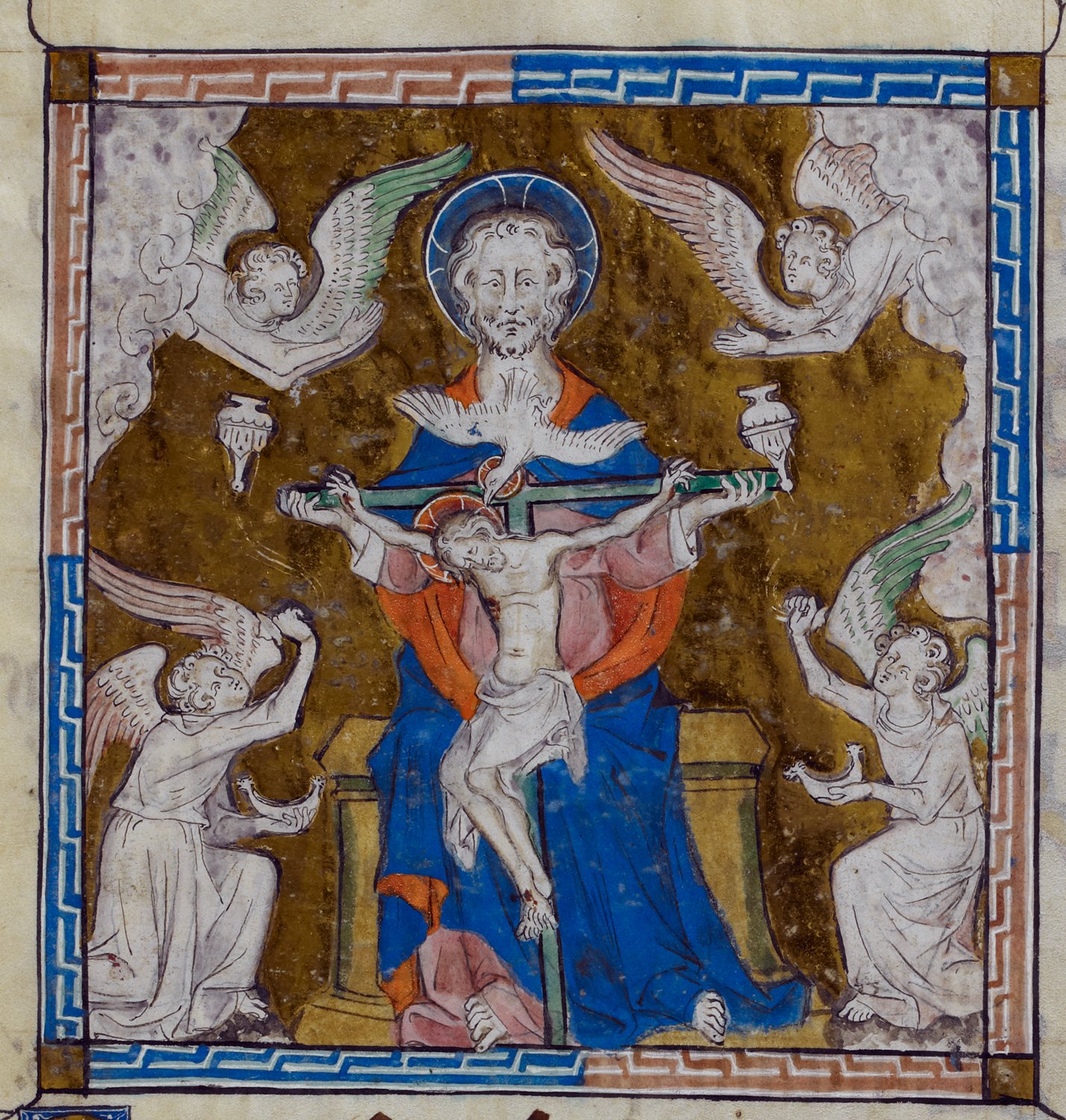
We know that the Passion of Jesus--"glorification" in the language of St John the Evangelist--released the Holy Spirit upon the world. John 7:39 and 16:7 make that abundantly clear.
What's often lost upon us poor Anglophones at the mercy of Bible translations is that the Greek text behind the verse we all think we know, "He gave up the ghost," says, literally, "He handed [over] the Spirit" (paredōken to Pneuma, Jn 19:30). Scholars call this the "Johannine Pentecost"; many are needlessly confused about this version of "Pentecost" vis-a-vis the version we all know from Acts 2, but that's a topic for another post.
We ought to pair with this Passion-Pentecost relay with Hebrews 9:14, "...how much more shall the Blood of Christ, who through the eternal Spirit offered Himself without blemish to God..." which, in turn, suggests to us that the Holy Spirit had a role in Jesus' very self-offering to His Father.
The overall thrust of Hebrews was to demonstrate the validity of Jesus' priesthood despite His descent from the tribe of Judah rather than Levi; that validity was demonstrated by the sacred author's appeal to Psalm 110:4 (cf Heb 7:7). At the very start of Hebrews, however, there is a subtle hint that could easily get lost in that forest of words and ideas, especially at 1:9, "You have loved righteousness and hated lawlessness; / therefore God, your God, has anointed you / with the oil of gladness beyond your comrades." This, in turn, is taken from Psalm 45:7. What was this "oil of gladness," and when was Jesus "anointed"?
St Thomas Aquinas appeals to Romans 14:17 in explaining this "oil of gladness," where St Paul says that "...the Kingdom of God does not mean food and drink but righteousness and peace and joy in the Holy Spirit"; to this we can easily add that verse from St Luke, "At that time, Jesus rejoiced in the Holy Spirit" (Lk 10:21). The anointing itself took place at Jesus' conception (cf Mt 1:18; Lk 1:35), otherwise He wouldn't be "Christ" until later on--and there was never a time when Jesus was not "the Christ," that is, the Anointed One, and it was precisely this anointing of Jesus how He was able to "offer Himself without blemish" by way of the "eternal Spirit."
Going back to Hebrews 1:9/Psalm 45:7, especially where it reads "...anointed you above your fellows," bear in mind that the anointing of Christians is an overflow from Christ's own anointing: "From His fullness have we all received, grace upon grace" (Jn 1:16); by the Father's arrangement, the Anointing belongs to Jesus (cf Is 11:1-3, 61:1), and Christians receive it only from Christ Himself.
But what does this mean?
The "baptismal priesthood" or the "royal priesthood" is a grace that the entire People of God share in--as distinguished from the ministerial priesthood of the ordained. The whole Body of Christ--clergy and laity--receive the overflow of the Anointed One's superabundant unction such that we are constituted a "holy priesthood" (1 Pt 2:5, 9) and "a kingdom, priests to His God and Father" (Apoc 1:6).
The question remains: What does it mean to be a "holy priesthood"? St Peter offers us a hint: "...be yourselves built up into a spiritual house, to be a holy priesthood, to offer spiritual sacrifices acceptable to God through Jesus Christ" (1 Pt 2:5). A priest, by definition offers a sacrifice; it is false to think that a "sacrifice" necessarily involves killing or bloodshed; rather, to sacrifice something is to make that something sacred--notice how each word begins with "sacr--": sacrifice; sacred. Our question then becomes: What, then, do I sacrifice? With what do I offer this sacrifice?
St Paul answers the question for us:
I appeal to you, therefore, brethren, by the mercies of God, to present your bodies as a living sacrifice, holy and acceptable to God, which is your spiritual worship (Rom 12:1).Now do you see what Jesus did? By His indwelling Holy Spirit, His self-offering to the Father was enabled and "without blemish" (Heb 9:14); we Christians thus share in the priesthood of Jesus by offering ourselves along with Him--which is the full meaning of Colossians 1:24.
The royal priesthood which we all share in is not an opportunity to try to pull rank in the Church as a kind of power-play; rather, it is an opportunity to let God himself pull rank on us because our anointing thus enables us to surrender ourselves completely to God. The Holy Spirit enabled Jesus to surrender Himself on the Cross for our salvation; the Holy Spirit also enables us to surrender ourselves with Jesus; the Holy Spirit, therefore, is the very rubric whereby we obey the Lord's command to "take up your cross and follow Me" (Mt 16:24-26).
Enough with tokenism. Enough of using devotions as a bargaining chip. The Bible is clear--as Christians, we must surrender ourselves to the Lord, giving him sovereignty in our lives. That's what the anointing is for. By refusing this self-surrender, we shirk from discipleship.
Do not let a single drop of that unction of the Holy Spirit go to waste.



No comments:
Post a Comment
Please ensure that comments are concise, to the point, and substantiated. All laws of English grammar remain in force. Thanks!